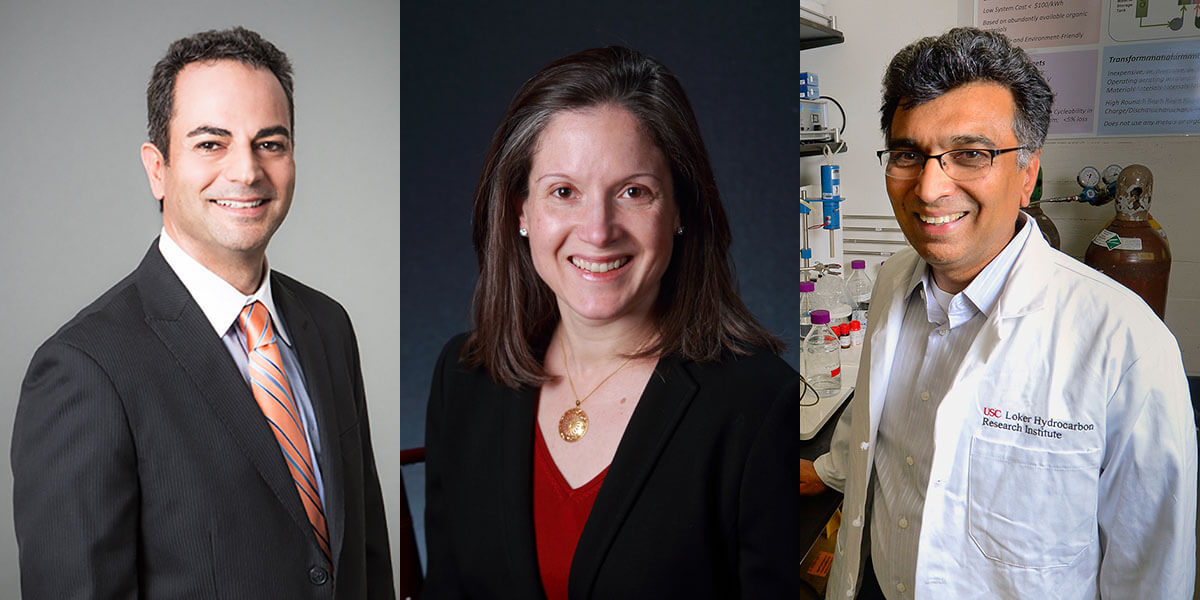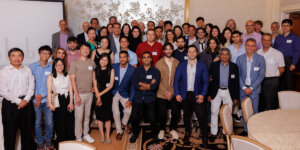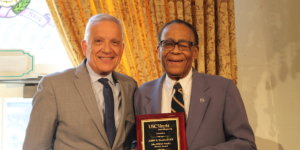
New NAI Fellows Cyrus Shahabi, Andrea Armani and Sri Narayan (Photos/Courtesy of USC Viterbi and Gus Ruelas)
USC professors Andrea Armani, Sri Narayan, and Cyrus Shahabi have been elected as National Academy of Inventors Fellows, the highest professional distinction accorded solely to academic inventors. They join a distinguished class of 175 new inductees and bring USC’s overall total to 21.
The NAI Fellows Program, established in 2010, spotlights academic inventors who have “demonstrated a prolific spirit of innovation in creating or facilitating outstanding inventions that have made a tangible impact on quality of life, economic development and the welfare of society,” according to the NAI.
Collectively, fellows hold about 43,000 issued U.S. patents, which have generated over 13,000 licensed technologies, 3,200 companies and created more than 1 million jobs. In addition, over $3 trillion in revenue has been generated based on NAI Fellow discoveries.
As a reflection of their excellence, more than 150 NAI Fellows serve as presidents and senior leaders of research universities, governmental and non-profit research institutes; about 600 are members of the National Academies of Science, Engineering and Medicine; and dozens are Nobel Laureates, the NAI said.
Andrea Armani
Andrea Armani, vice dean of new initiatives at the USC Viterbi School of Engineering and the Ray R. Irani Chair in Chemical Engineering and Materials Science, aims to invent new nanomaterials and optical devices that are applicable in portable disease diagnostics and telecommunications. To accomplish this goal, her lab’s research combines multiple disciplines in engineering and sciences and frequently collaborates with industry partners.
Recently, Armani led a joint industry-academic team to develop a quick and cost-effective solution to allow medical professionals to easily sterilize their PPE for safe reuse. Working in partnership with the Keck School of Medicine of USC and Glendale, California-based SMP Engineering, Armani’s team developed a UV light sterilization box for medical equipment such as face shields that can be built using 18-gallon plastic bins, coated on the inside with reflective chrome paint and fitted with 15-watt, high-intensity UV-C bulbs — items one can easily find at stores like Lowe’s or The Home Depot. The device can sterilize three face shields in six minutes.
Armani, who also serves as the director of the John O’Brien Nanofabrication Laboratory, has received numerous awards. They include the ONR Young Investigator; the White House Presidential Early Career Award for Scientists and Engineers (PECASE); a MIT Technology Review “Top 35 Innovators under 35;” and was named as a World Economic Forum “Young Global Leader.”
Sri Narayan
Sri Narayan, professor of chemistry at the USC Dornsife College of Letters, Arts and Sciences, is just the third USC Dornsife faculty member to be elected an NAI Fellow.
“I am pleased to be recognized by this illustrious and creative group of academic researchers and also to be joining a talented group of NAI Fellows at USC,” Narayan said. “Apart from the joy of recognition, my election as fellow of the NAI reiterates that inventive and creative contributions by academia have a chance to be recognized as much as scholarship.”
Narayan investigates, among many things, how to build better batteries and how sunlight and carbon dioxide can efficiently be converted to electricity. His studies aim to reduce dependence on fossil fuels by making the generation of energy from renewable sources, such as wind and sunlight, more practical.
“The goal of my research and inventions is to address the global challenge of achieving net-zero carbon emissions through the pervasive use of renewable energy in all spheres of human activity,” he said, noting that he hopes his research also helps those struggling around the globe to meet their energy needs. “I want my work on batteries to reach the neglected segments of the world population who have no access to electricity.”
Before joining USC Dornsife and the USC Loker Hydrocarbon Research Institute in 2010, Narayan spent two decades at NASA’s Jet Propulsion Laboratory, where he spearheaded efforts to develop fuel cells and led the Electrochemical Technologies Group. While at JPL, he pioneered the use of methanol as a power source in fuel cells and worked to advance hybrid power sources for space and defense applications, among many projects.
His research at USC Dornsife, aimed at developing new battery technologies, includes the use of lithium-sulfur, which is safer than current lithium-ion materials and can hold as much as three times the energy while using abundant, less-expensive materials. He also works on iron-based batteries and liquid-based redox-flow batteries, technologies that hold particular promise for storing energy generated by renewable sources, such as sunlight and wind.
Cyrus Shahabi
Cyrus Shahabi – the Helen N. and Emmett H. Jones Professor in Engineering and chair of USC Viterbi’s Department of Computer Science — focuses on data management and analysis, specialized in spatial and geospatial data sets.
Recently, a team of researchers overseen by him combined location density with real-world mobility data to predict the risk of infection from Covid-19 at specific locations with unprecedented accuracy. The result: their system showed a 50% improvement in accuracy compared to existing ones.
Shahabi, a professor of computer science, electrical and computer engineering, and spatial sciences, also has an entrepreneurial bent. The director of the Integrated Media Systems Center (IMSC) at USC Viterbi, he was the CTO and co-founder of a USC spin-off, Geosemble Technologies, which was acquired in July 2012. He also founded another company, TallyGo, focusing on predictive path-planning for car navigation systems, which was acquired in 2019.
Over his distinguish career, Shahabi has won a raft of prestigious awards. He is a fellow of IEEE; a recipient of the ACM Distinguished Scientist award; the White House Presidential Early Career Award for Scientists and Engineers (PECASE); the NSF CAREER award; and the Okawa Foundation Research Grant.
Published on December 7th, 2021
Last updated on January 26th, 2022











